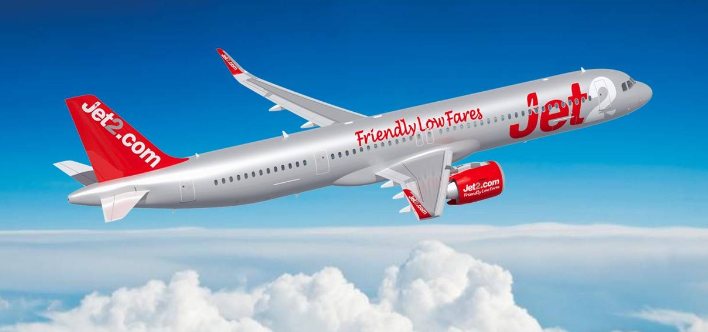Jet2 has exercised its remaining 36 options for Airbus aircraft. The UK airline now has a firm order backlog of 146 A321neos delivering from last year out until 2035.
Jet2 chairman, Robin Terrell, said that the company’s “well capitalised balance sheet enabled the Group to continue to invest for long-term growth, including the integration of a further six new Airbus A321neo into our aircraft fleet”.
Revenues booked by Jet 2 for its full financial year to end March 2024 (FY24) rose by 24% over the prior year to £6.255bn, with an operating profit of £428.2 million – a rise of 9% compared to FY23. Profit before tax and FX costs rose by 33% to £520.1 million.
The operating profit includes a loss from broader disruption caused by the NATS failure of approximately £140 million, disruption caused by the Rhodes wildfires, and flooding in Skiathos.
For the reporting period, seat capacity increased 10% to 19.73 million, with an average load factor of 89.8% (2023: 90.5%). Jet2 reports customers are booking closer to departure, although pricing remains “robust. Flight-only net ticket yield per passenger sector increased 14% to £114.23 compared to £100.28 in FY23.
Jet2’s total capital expenditure for the financial year 2024 amounted to £408.0 million, compared to £196.6 million in2023, primarily representing balance payments for six Airbus A321neo aircraft delivered during the year, together with pre-delivery payments for future arrivals. With its long-term aircraft delivery stream in mind, Jet2 has acquired additional premises at Manchester Airport to build a second aircraft maintenance facility which is expected to be operational from late 2025.
Net financing income (excluding net FX revaluation gains) increased by £94.4 million to £88.6 million, primarily due to £159.5 million of finance income driven by higher levels of cash deposits coupled with increases to bank interest rates made over the course of the financial year. Finance expenses of £70.9 million increased chiefly due to additional interest incurred on lease liabilities as a result of aircraft acquired to support capacity growth.
Jet2 confirmed that it had purchased a number of the A321neo aircraft delivered during the year with its own cash reserves. The airline also confirmed the repayment of the final instalments of debt acquired during the pandemic of £82.2 million, which was secured against twelve Boeing 737-800NG midlife aircraft. Jet2 also prepaid remaining debt obligations secured against three Boeing 737-800NG aircraft of £41.2 million, this acquired between 2016 and 2019 at a higher funding cost than the Group can currently access in aircraft financing markets.
In October 2023, the Group extended its sustainability-linked Revolving Credit Facility (RCF) by a further year through to October 2027, on the same commercial terms with its four relationship banks: Barclays Bank; HSBC; Lloyds Bank; and National Westminster Bank.
Other items totalling an inflow of £1.1 million include £3.3 million of proceeds from retired aircraft and engine sales, which was offset by the effect of foreign exchange rate changes on the Group's cash and money market deposit balances which totalled a £2.2 million loss.
Jet2 stated that it had made further progress on its goal to embed the use of Sustainable Aviation Fuel (SAF) into its operations. In 2024, Jet2.com says it will use a 1% blend of SAF at London Stansted, Bristol and Malaga airports, purchasing approximately 1,200 tonnes almost a year ahead of the UK and EU governments' SAF mandates set to be introduced from January 2025.
Jet2 has called on the UK Government to upscale its investment in SAF, ring-fence annual UK Emissions Trading Scheme revenues for decarbonisation projects, work multilaterally with governments across Europe to implement Air Traffic Management reforms; and to support airport operators and remove obstacles around upgrades to electrical infrastructure.
Jet2 adds more A321neos; full financial year results positive
